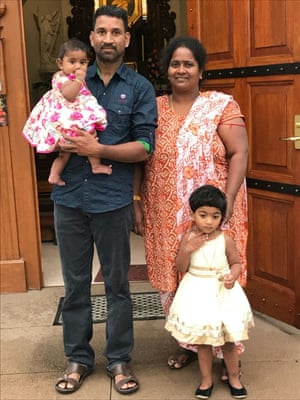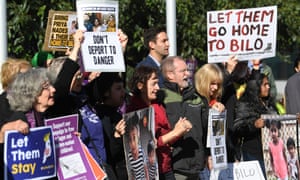The Coalition says there can be no exceptions but is happy to help au
pairs, while Labor has chosen to fight on this case but ignore hundreds
more
The circumstances of the Tamil family at the centre of the battle
playing out between the federal court in Melbourne and Christmas Island
are heartbreaking and traumatic. Few who watched footage of the
deportation attempt could argue against that, but the circumstances of
the case are not particularly unique save for the outcry and support it
has garnered.
It’s a fact that the family have been denied protection as refugees. Their cases were not found to be strong enough, but the family has said those assessing their case looked at the wrong things. While it went through several levels of the court system, their actual claims for protection were never reassessed.
It is also a fact that the manner in which Priya and her daughter Kopika were assessed has been heavily criticised for a number of years, and not just for how they were assessed but how everyone was assessed.

It’s a fact that the family have been denied protection as refugees. Their cases were not found to be strong enough, but the family has said those assessing their case looked at the wrong things. While it went through several levels of the court system, their actual claims for protection were never reassessed.
It is also a fact that the manner in which Priya and her daughter Kopika were assessed has been heavily criticised for a number of years, and not just for how they were assessed but how everyone was assessed.

Asylum seekers rejected and deported under this process have later been found to be refugees by the UNHCR.
This process affects thousands.
When Priya’s final bridging visa expired, the family were detained in a now infamous pre-dawn raid on their home in the quiet Queensland town of Biloela.
They were flown thousands of kilometres away to Melbourne’s immigration transit accommodation, and put in a compound for families, under guard and with strict visitation rules. The government suggests it’s not really detention yet refers to it as detention in literature, and the occupants aren’t allowed out.
The denial of refugee status has legal explanations, however flawed or unfair they may be. But the family’s treatment, and the treatment of potentially thousands of others who have been rejected but are exercising their right to legal challenge, does not have a logical explanation.
The Tamil family are not the only people in detention. They are not even the only people with children in detention.
Over the last 18 months the family has been subject to a number of micro cruelties – denial of a birthday cake for two-year-old Tharunicaa, and arbitrary rule changes around visitation. The allowance and then withdrawal of external childcare, an alleged lack of vitamins and dental care leading to painful teeth issues for Tharunicaa, and the alleged delay in medication for Priya.
When the family first arrived they weren’t allowed to interact with fellow detainee and Vietnamese woman Huyen and her infant daughter Isabella. That changed and the two families soon became as close as family. But then the Tamils were ripped away on a Friday evening, with no chance to say goodbye. Isabella is 18 months old and has lived her life in the facility. After losing her sisters, aunty and uncle, this was another cruelty on top of she and Huyen’s own list of illogical cruelties.
A zero-notice deportation can prevent legal injunctions – although it didn’t this time. But what is the logical explanation for a pre-dawn raid on a house with a family who wasn’t going anywhere? What is the logical explanation for denial of a birthday cake? What is the logical explanation for the midnight transfers of countless other adults in onshore detention which send them out of reach of their families?
There are others who have been rejected, deported and then disappeared, arrested, or even killed after they return to their home country. There are also thousands of people who were found to be refugees but who aren’t allowed to stay in Australia at all, or who can stay but only for three years until they must ask again. But it is the Tamil family’s cause which has been singularly taken up by people like Alan Jones, Barnaby Joyce and Anthony Albanese, who have called for them to stay.
Why has Labor, which largely agrees with most of the Coalition’s border control policies, chosen to fight for this family and none of the others?
There is a festival of double standards – from those who support this family’s freedom but not the freedom of others, from those who say there can be no exceptions for this family but then make exceptions for au pairs and drug traffickers, and from those who cry “precedent”.
Dutton and Morrison have repeatedly said that intervening here would send a message to people smugglers, but multiple media investigations have found there to be no evidence of that.
Abul Rivzi, former deputy secretary in the Department of Immigration, said the Tamil case was actually one which the minister should have intervened in precisely because of the message it would send.
Around 100,000 people are currently in Australia seeking asylum or in courts fighting their rejected claims.
Rivzi told the ABC last week the family had community ties and had settled in remote and regional Australia, just like the government wants migrants to do, and the case was always likely to go “all the way down the line” at extraordinary cost of at least $1m.
“The rationale as I understand it is that if [the minister] were to intervene and grant a visa in this case, they’d be under pressure to use the discretion in lots and lots and lots of other cases,” he said. “But look at it the other way around. If a large portion of those 100,000 cases go through the pain and cost of this case, what does that mean? Does the home affairs department have the money to go through all those cases? Obviously not.”
The federal government has backed itself into a political corner where it has two choices: to let them stay and look weak, or to boot them out and look cruel. They haven’t feared looking cruel in the past.
There is a good chance the family will be sent back to Sri Lanka. Thousands of others already have been. There is some chance they’ll be allowed to apply to come back on work or other visas, having had their deportation bill and reentry bans waived.
What remains is whether this case prompts some reassessment of values or even the pursuit of just a bit of logic in how Australia treats people.

No comments:
Post a Comment